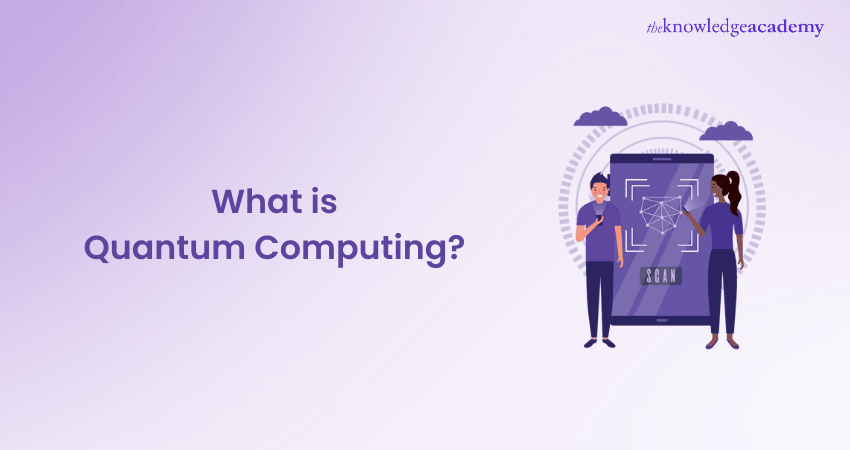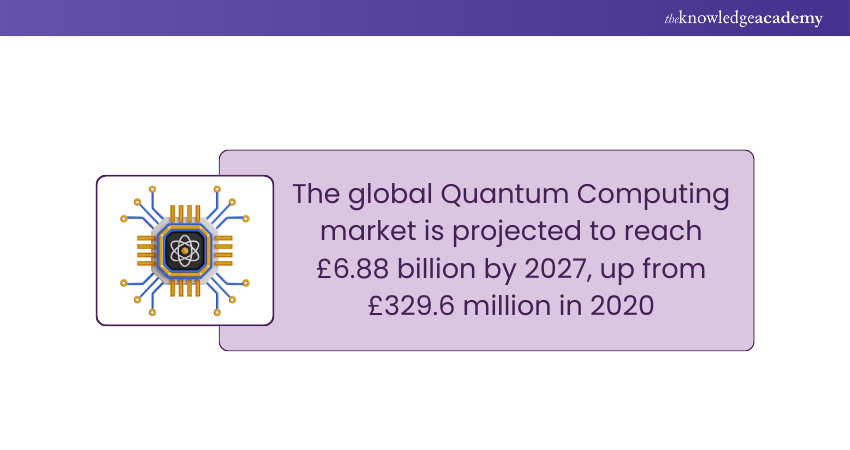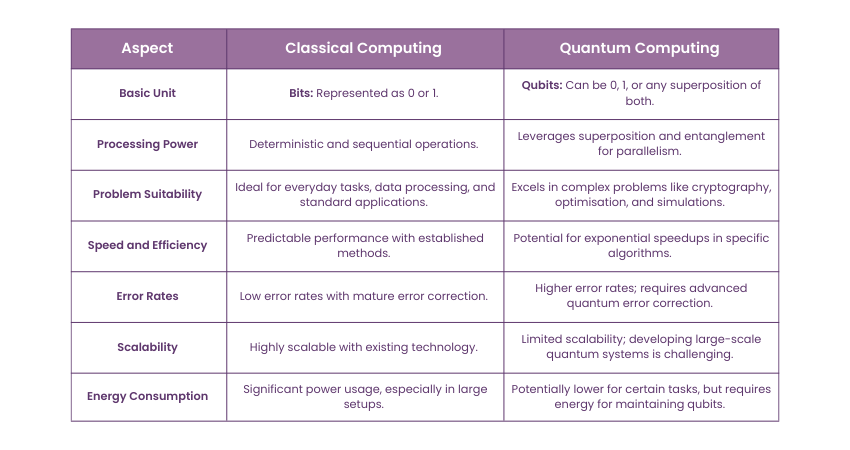We may not have the course you’re looking for. If you enquire or give us a call on + 1-866 272 8822 and speak to our training experts, we may still be able to help with your training requirements.
We ensure quality, budget-alignment, and timely delivery by our expert instructors.

Are you a Science, Technology, Engineering or Mathematics (STEM) student, researcher or professional? Perhaps you are curious about the cutting-edge developments in the field of computing and want to explore something similar. Or maybe you are just an avid learner and want to understand a new paradigm for solving complex problems. If so, Quantum Computing is just for you. You might ask, ‘What is Quantum Computing?’ and wonder why you should care about it.
In this blog, we will cover What is Quantum Computing, its types, and principles while also explaining its challenges and limitations. Also, we will provide a closer look at some of the current and future applications of Quantum Computing.
Table of Contents
1) What is Quantum Computing?
2) What are the Principles of Quantum Computing?
3) Types of Quantum Technology
4) How Can Companies Use Quantum Computing?
5) Classical Computing Versus Quantum Computing
6) Can You Emulate Quantum Computers?
7) Examples of Quantum Computers
8) What is Quantum Computing in a Nutshell?
9) What is Quantum Computing as an Example in Real Life?
10) Conclusion
What is Quantum Computing?
Quantum Computing is a revolutionary approach to computation that leverages the principles of quantum mechanics. Quantum Computing is like the superhero version of regular computing. Unlike classical computers, which use bits to represent data as either 0 or 1, Quantum Computers use quantum bits or Qubits. Qubits can exist simultaneously in multiple states thanks to Superposition and Entanglement phenomena.
These Qubits allow Quantum Computers to perform complex calculations at unprecedented speeds, potentially solving infeasible problems for classical computers. They're like the secret weapon for cracking codes, finding new drugs, and solving challenging problems faster than regular ones. The Quantum Computing Guide emphasizes that Quantum Computing holds promise for cryptography, optimization, drug discovery, and materials science breakthroughs, paving the way for a new era of computing and technological advancements.
How Does a Quantum Computer Work?
Quantum Computers work differently from classical computers by harnessing the principles of quantum mechanics. Qubits are the fundamental information units at the heart of a Quantum Computer. Unlike classical bits, which can be either 0 or 1, Qubits can exist in multiple states simultaneously, a phenomenon known as Superposition. Additionally, Qubits can be entangled, meaning the state of one qubit depends on the state of another, regardless of the distance between them.
Quantum Computers use quantum gates to manipulate and process Qubits, similar to classical computers' logic gates to manipulate bits. These gates perform operations on Qubits, exploiting their quantum properties to perform computations. Quantum algorithms, such as Shor's and Grover's algorithms, leverage these unique properties to solve certain problems much faster than classical algorithms.
However, managing Quantum Computing's delicate Qubits' state presents both advantages and disadvantages, as it is highly susceptible to decoherence, which can disrupt quantum information. To address this challenge, Quantum Computers rely on specialised techniques like error correction and quantum error correction codes to counteract decoherence and maintain reliable computation.
What are the Principles of Quantum Computing?
Quantum Computing operates on fundamental principles of quantum mechanics, offering unique capabilities compared to classical computing.
Here are some of the key principles:
a) Quantum Bits (Qubits):
Unlike classical bits, which can be either 0 or 1, qubits can exist in a superposition of states, meaning they can be both 0 and 1 simultaneously. This property allows quantum computers to process a vast amount of information in parallel.
b) Superposition:
This principle allows qubits to be in multiple states at once. It’s like being able to explore many possible solutions to a problem simultaneously.
c) Entanglement:
When qubits become entangled, the state of one qubit is directly related to the state of another, no matter how far apart they are. This property enables quantum computers to perform complex calculations more efficiently than classical computers.
d) Quantum Gates:
These are the quantum equivalent of classical logic gates. They manipulate qubits through operations that change their state, enabling the execution of quantum algorithms.
e) Quantum Interference:
This principle is used to amplify the probability of correct solutions and cancel out incorrect ones, enhancing the accuracy of quantum computations.
f) Quantum Decoherence:
This is the loss of quantum coherence, where qubits lose their quantum properties due to interaction with the environment. Managing decoherence is one of the major challenges in building practical quantum computers.
Types of Quantum Technology
Quantum Technology encompasses various approaches to harnessing the principles of quantum mechanics for practical applications. Here are the types of Quantum Technology:
1) Gate-based Ion Trap Processors
These systems use ions (charged atoms) held in place by electromagnetic fields as Qubits. Quantum information is manipulated through the application of laser pulses and microwave fields. Ion trap processors offer long coherence times and high-fidelity operations, making them promising candidates for quantum computation and quantum simulation tasks.
2) Gate-based Superconducting Processors
Superconducting Qubits are fabricated from superconducting materials and manipulated using microwave pulses. They are scalable and relatively easy to control, making them one of the leading platforms for Quantum Computing research. However, superconducting Qubits are susceptible to noise and decoherence, posing challenges for achieving fault-tolerant quantum computation.
3) Photonic Processors
Photonic Qubits are encoded in photons, the fundamental particles of light. These processors manipulate Qubits using optical elements such as beam splitters and phase shifters. Photonic processors offer low decoherence rates and compatibility with long-distance quantum communication. They are particularly suitable for tasks involving quantum communication and quantum cryptography.
4) Neutral Atom Processors
Neutral atom Qubits are atoms with balanced numbers of protons and electrons, manipulated using laser beams. They offer long coherence times and high-fidelity operations, similar to ion trap processors. Neutral atom processors have potential applications in quantum simulation and quantum metrology tasks.
5) Rydberg atom Processors
Rydberg atoms are highly excited atoms with electrons in high-energy states, manipulated using laser fields. These processors offer strong interactions between Qubits, enabling the implementation of entangling gates with high fidelity. Rydberg atom processors are being explored for quantum simulation and quantum communication tasks.
6) Quantum Annealers
Quantum annealers are specialised quantum processors designed to solve optimisation problems. They exploit quantum annealing, a quantum optimisation technique inspired by Simulated Annealing in classical computing. Quantum annealers are particularly effective for solving combinatorial optimisation problems, such as finding the optimal configuration of a complex system.
Unleash your potential and stay ahead in the rapidly evolving world of technology with our Advanced Technologies Courses - join now!
How Can Companies Use Quantum Computing?
Quantum Computers possess four key capabilities that distinguish them from classical computers and can be useful for businesses in the coming years:

Quantum Simulation
Quantum Computers excel at modelling complex molecules, offering potential chemical and pharmaceutical research benefits. Quantum Computers could expedite drug development processes by accurately simulating molecular interactions, leading to faster discoveries and transformative medical breakthroughs.
Optimisation and Search
Quantum Computing enables rapid optimisation across various industries. Unlike classical computers, which perform sequential calculations, Quantum Computers can simultaneously explore multiple variables, efficiently narrowing down the range of possible solutions. This capability streamlines decision-making processes, enhancing efficiency and value creation.
Quantum AI
Quantum Computers hold the promise of revolutionising machine learning algorithms. Their ability to handle complex calculations with numerous variables simultaneously accelerates the training of Artificial Intelligence (AI) systems. Applications range from pharmaceutical research to automotive technology, with the potential to advance fields like self-driving vehicles.
Prime Factorisation
Quantum Computers can solve complex prime factorisation problems, which is crucial for encryption in cybersecurity. While classical computers struggle with large prime numbers, quantum algorithms like Shor's algorithm have the potential to solve these challenges efficiently. As Quantum Computing advances, new encryption technologies will be necessary to secure online services, driving the development of quantum cryptography.
Classical Computing Versus Quantum Computing
Here are the differences between Classical Computing and Quantum Computing:

Can You Emulate Quantum Computers?
Yes, classical computers can emulate quantum computers to a certain extent. Using specialised software and algorithms, they can simulate quantum circuits and small-scale quantum systems. However, emulating larger quantum computers becomes exponentially challenging due to the immense computational resources required to represent and process quantum states.
Emulators are useful for developing and testing quantum algorithms on a small scale but cannot match the parallelism and speed of actual quantum hardware. Thus, true quantum advantages remain achievable only with physical quantum computers.
Unlock the power of Nano Technology- join our Nano Technology Training now!
Examples of Quantum Computers
Here are some notable examples of quantum computers developed by leading organisations in the field:
1) IBM Quantum System One
IBM Quantum System One now features a 127-qubit processor. It remains a cornerstone for IBM's quantum research and applications, accessible through IBM's cloud-based platform, IBM Quantum Experience.
2) Google Sycamore
Google's Sycamore processor initially had 54 qubits. However, recent updates indicate that Google has developed a 67-qubit version. Sycamore gained significant attention for achieving quantum supremacy by performing a specific computation faster than the most powerful classical supercomputers available at the time.
3) D-Wave Advantage
D-Wave's Advantage quantum computer utilises over 5,000 qubits. It is designed to solve complex optimisation problems through quantum annealing, making it suitable for applications in logistics, machine learning, and material science.
4) IonQ Quantum Computer
IonQ employs trapped ion technology in their quantum computers, currently featuring 32 qubits. Trapped ions offer high-fidelity qubits with long coherence times, making them ideal for precise quantum operations.
5) Microsoft Quantum Hardware
Microsoft is exploring topological qubits, a theoretical approach aimed at creating more error-resistant qubits through their unique topological properties. This technology is still largely in the research phase, but Microsoft's integration with Azure Quantum services aims to provide a robust ecosystem for developing and deploying quantum applications.
6) Alibaba Micius
Alibaba's Micius quantum computer utilises photonic Quantum Computing with 12 qubits. This approach leverages photons as qubits, which are less susceptible to decoherence and ideal for quantum communication.
What is Quantum Computing in a Nutshell?
Quantum Computing leverages quantum bits (qubits) and principles such as superposition and entanglement to perform complex calculations much faster than classical computers for specific tasks.
What is Quantum Computing as an Example in Real Life?
Quantum computers can:
a) Optimise supply chains by finding the most efficient routes and schedules.
b) Accelerate drug discovery by accurately simulating molecular interactions.
c) Enhance cryptography to secure communications through advanced encryption methods.
d) Improve financial modelling for better investment strategies and risk management.
Preparing for a quantum computing interview? Review the best Quantum Computing Interview Questions to ensure you're ready to answer tough, technical questions with confidence.
Conclusion
Understanding What is Quantum Computing reveals its transformative potential in solving complex problems beyond classical capabilities. As technology advances, overcoming current challenges will unlock new applications, driving innovation across industries. Embracing Quantum Computing promises to revolutionise the future of technology and problem-solving.
Unlock the potential of 5G technology with our comprehensive 5G Wireless Training. Register today!
Embark on your Quantum Computing journey and unlock the future of technology with our comprehensive Quantum Computing Training - sign up today!
Frequently Asked Questions
What is the Main Goal of Quantum Computing?

The main goal of Quantum Computing is to harness quantum mechanics principles, such as superposition and entanglement. This enables solving complex problems more efficiently than classical computers in fields like cryptography, optimisation, and material science.
What are Some of the Challenges and Limitations of Quantum Computing?

Quantum Computing faces challenges, including qubit stability, high error rates, and scalability. Additionally, maintaining quantum coherence, developing effective error correction, and creating practical quantum algorithms are significant limitations that need to be addressed.
What are the Other Resources and Offers Provided by The Knowledge Academy?

The Knowledge Academy takes global learning to new heights, offering over 3,000 online courses across 490+ locations in 190+ countries. This expansive reach ensures accessibility and convenience for learners worldwide.
Alongside our diverse Online Course Catalogue, encompassing 19 major categories, we go the extra mile by providing a plethora of free educational Online Resources like News updates, Blogs, videos, webinars, and interview questions. Tailoring learning experiences further, professionals can maximise value with customisable Course Bundles of TKA.
What is The Knowledge Pass, and How Does it Work?

The Knowledge Academy’s Knowledge Pass, a prepaid voucher, adds another layer of flexibility, allowing course bookings over a 12-month period. Join us on a journey where education knows no bounds.
What are the related courses and blogs provided by The Knowledge Academy?

The Knowledge Academy offers various Advanced Technologies Courses, including Quantum Computing Training and 5G Wireless Training. These courses cater to different skill levels, providing comprehensive insights into Digital Technology.
Our Advanced Technologies Blogs cover a range of topics related to Quantum Computing, offering valuable resources, best practices, and industry insights. Whether you are a beginner or looking to advance your Quantum Computing skills, The Knowledge Academy's diverse courses and informative blogs have you covered.
Upcoming Advanced Technology Resources Batches & Dates
Date
 5G Wireless Training
5G Wireless Training
Thu 27th Mar 2025
Thu 29th May 2025
Thu 24th Jul 2025
Thu 4th Sep 2025
Thu 6th Nov 2025






 Top Rated Course
Top Rated Course



 If you wish to make any changes to your course, please
If you wish to make any changes to your course, please


